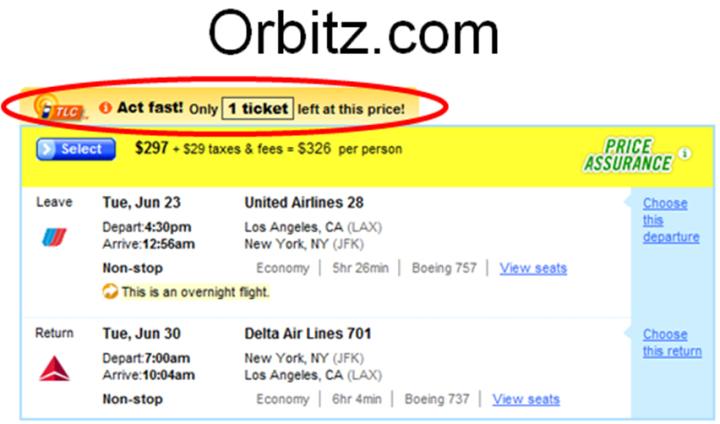DAY 5: Can You Sell More by Offering Less? Exercises in Scarcity Marketing
One day sale!
Limited time offer!
These deals won’t last!
We’ve seen messages like these our entire lives. There is a well-known persuasion principle at work here and marketers have been using it to sell product and services forever. It’s the principle of scarcity.
What is scarcity?
According to Wikipedia, scarcity is “the problem of infinite human needs and wants, in a world of finite resources.” What a great definition!
How does it persuade?
In a nutshell: You want now what you may not be able to get in the future.
We find things that are scarce desirable. If something is difficult to obtain, then getting it demonstrates to ourselves and others that we are in control of our environment. If a person or company comes along and threatens to take away that which we desire or somehow limit its supply, it triggers our primal need to remain in control – and not be controlled.
If you can control supply, then you have a significant lever on demand – and you can artificially create scarcity. The De Beers Company buys huge quantities of diamonds on the world market, simply to keep them scarce so that their high price is maintained. OPEC works in a similar way.
A study conducted by Zhang, Ying, Fishbach, and Ayelet in 2005 supports this, concluding that “individuals evaluate losses more extremely than gains of similar size”.
 Think about the gasoline shortage in the early 70s. Or consider what happens with dwindling water supplies during a drought or emergency. Gas and water are considered essential to survival (well, sadly, gas is considered essential in North America) so people line up at the mere mention of a shortage and can actually fuel a downward spiral. But the same principle holds true for ordinary, everyday items as well as for luxury items.
Think about the gasoline shortage in the early 70s. Or consider what happens with dwindling water supplies during a drought or emergency. Gas and water are considered essential to survival (well, sadly, gas is considered essential in North America) so people line up at the mere mention of a shortage and can actually fuel a downward spiral. But the same principle holds true for ordinary, everyday items as well as for luxury items.
For example… people flock to see a heavily censored film. Music that is banned on radio stations typically shoots up the charts. ‘Bad boys’ are often desirable to young women if for no other reason than prior admonishment from trying-to-do-right parents; rebellion is definitely connected to scarcity (i.e., trying to have what you are told you cannot or should not have).
 The same holds true for banned substances. When we realize that we do not have something, we desire it. But when someone or some agency bans that ‘something’, it only makes things worse. Interestingly, when ‘Lady Chatterley’s Lover’ was first published it was banned. Apparently many black market copies were sold and it made the author, D.H. Lawrence, famous.
The same holds true for banned substances. When we realize that we do not have something, we desire it. But when someone or some agency bans that ‘something’, it only makes things worse. Interestingly, when ‘Lady Chatterley’s Lover’ was first published it was banned. Apparently many black market copies were sold and it made the author, D.H. Lawrence, famous.
And in the more recent past, do you remember the insanity surrounding these popular – and heavily advertised – Christmas gifts? The Pet Rock (1975), Star Wars toys (1978), Rubik’s Cube (1982), Cabbage Patch Dolls (1983), Tamagotchi (1996), Furby (1998) and the Nintendo Wii (2006) are all examples of scarcity being applied during the holiday season: People were actually injured in the stampedes to obtain commercial items in limited supply.
Now if something is not scarce, then it is not desired or valued as much. Praise from a teacher who seldom praises is valued more than praise from a teacher who is liberal with his or her praise. And if everything is scarce, then scarcity itself lacks value and people become too used to it. Studies of retail sales have shown that if more than about 30% of goods have ‘sale’ sticker on them, the effectiveness of this method decreases. How persuaded are you by furniture stores that advertise weekly blowout sales?
Scarcity on the Web
How are companies applying the scarcity principle on the Web?
Going once, going twice, sold!  eBay is an entire business built on this principle, combining limited supply and a highest bidder pricing model to create a massive marketplace fuelled by scarcity – which ends up being highly persuasive (and addictive!). The study by Zhang, Ying, Fishbach, and Ayelet refers to this principle (as it applies to buyers and sellers) as the “endowment effect,” which is defined as “the gap between the price buyers are willing to pay in order to acquire an object and the price that sellers would demand in order to part with this object.”
eBay is an entire business built on this principle, combining limited supply and a highest bidder pricing model to create a massive marketplace fuelled by scarcity – which ends up being highly persuasive (and addictive!). The study by Zhang, Ying, Fishbach, and Ayelet refers to this principle (as it applies to buyers and sellers) as the “endowment effect,” which is defined as “the gap between the price buyers are willing to pay in order to acquire an object and the price that sellers would demand in order to part with this object.”
Gone in a flash! Scarcity is also applied as a persuasion technique by online apparel and fashion retailers — using a concept called “flash sales” — where goods are offered at sizable discounts for a limited period. Take a look at the following examples from Outnet.com and GiltGroupe.com:

Deals are flying out the door! We’re also seeing the scarcity principle applied by travel aggregators and airline sites. What could be more persuasive than learning there are only 2 seats available at the sale price?
Here are some ideas and things to remember when you’re trying to generate the same persuasive effect on your own site:
-
Strictly limit the amount of product you’re selling in a promotion. Display the quantity right up front in the headline where every visitor can see it — and strictly adhere to your statement.
-
Create time-sensitive deadlines that actually expire. Set a date for the promotion to end and offer a special discount on the product if purchased before that time — and don’t be tempted to extend the closing date. Credibility is the key to generating scarcity.
-
Try providing special ‘insider access’ passes or memberships to the first X number of respondents — or if your visitors order before a deadline. You increase value and evoke quicker responses by limiting the number of memberships available.
-
Offer forward-dated discount vouchers for future product releases. For example, “Buy our amazing software this week at $199 and you’ll automatically receive our next release with 12 additional features at just $99.”
-
Display dramatic ‘visual countdowns’ to increase the sense of scarcity and amplify your visitors’ urge to purchase.
Hopefully this sprinkling of scarcity mechanisms will inspire you to employ them in your own headlines and throughout your Web copy. If you state simply and clearly that a genuinely scarce commodity is available to a hungry target market (who you know want what you have!), and you can make it disappear before their eyes, people won’t stop reading. In the end, if you’ve done it correctly, they’ll place the order.
~Lance






1 comment